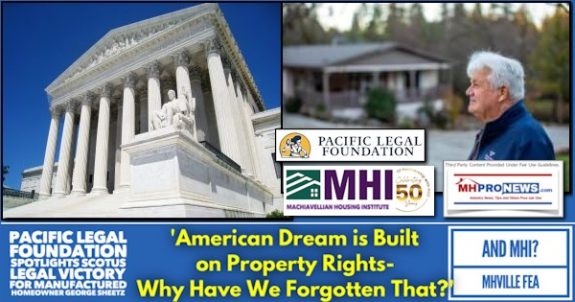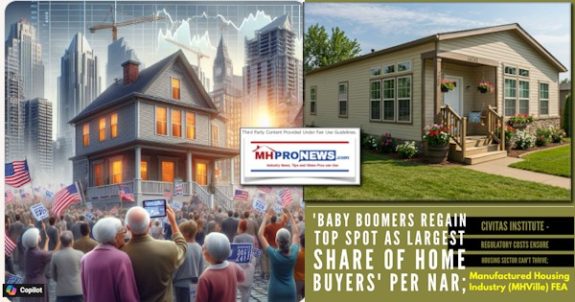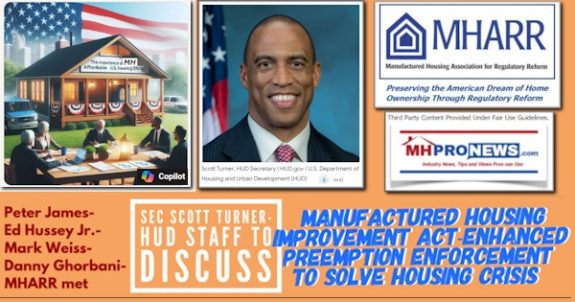MHI News
MHI Member Assistance Needed in Securing Co-Sponsors to H.R. 1779
In April, Reps. Stephen Fincher (R-TN), Bennie Thompson (D-MS) and Gary Miller (R-CA) introduced the Preserving Access to Manufactured Housing Act(H.R. 1779). The measure would amend provisions of the Dodd-Frank Wall Street Reform and Consumer Protection Act that would curtail the availability of credit needed by those seeking to purchase manufactured housing. Over the coming weeks, Sen. Sherrod Brown (D-OH) is expected to introduce companion legislation in the Senate. Additional information will be provided at that time.
Specifically, the bill would revise the High-Cost Mortgage triggers for manufactured home loans, and make clarifications to the Loan Originator definition as it applies to manufactured home retailers and salespeople. These two areas of the law – which are scheduled to become effective January 2014 – would substantially reduce lender ability to originate manufactured home loans.
Assistance is needed from MHI members and others within the manufactured housing industry in contacting their Representatives to request they co-sponsor H.R . 1779. A detailed issue brief/action alert, along with a sample letter that can be faxed to Congressional offices, can be found on the MHI Web site at www.manufacturedhousing.org.
• If you are unsure who your U.S. Representative is, use the search tool on the U.S. House of Representative’s Web site at www.house.gov.
• Support from members of the House Financial Services Committee is particularly important. Manufactured housing industry members with Representatives on this committee are asked to contact these Representatives ASAP to request they co-sponsor H.R. 1779. Visit the House Financial Services Committee Web site at financialservices.house.gov/about/members.htm to view a roster of the committee members.
• Highlighting the manufactured housing presence in your state is an effective way of underscoring the important role manufactured housing plays in the larger housing market. Visit the U.S. Census Web site atwww.census.gov/fastfacts/ to search the level of manufactured housing by state and county. Be sure to also mention the role your business plays in providing jobs and homes in your community!
MHI is grateful for the dedicated assistance provided by its members in working to secure bipartisan support for this important legislation. MHI thanks industry members and state associations in California, Mississippi and Tennessee for again working with Reps. Fincher, Thompson and Miller to secure their commitment to reintroduce this important legislation.
Dodd-Frank and CFPB Updates
U.S. Bank Launches Lobbying Effort in Support of Manufactured Housing Relief Legislation
In tandem with its existing advocacy activities seeking relief from the Dodd-Frank Act, U.S. Bank has officially begun broad lobbying efforts to assist MHI in passing House and Senate legislation that would maintain access to the credit needed to purchase manufactured housing. The full-scale involvement of U.S. Bank’s government relations team in Washington, DC will provide needed assistance to the manufactured housing industry’s efforts. MHI thanks long-time industry supporter and Financial Services Division and Board of Governors member Scott MacFarlane for his dedicated work in securing U.S. Bank’s corporate support of MHI’s efforts.
Fannie and Freddie Activity to be Limited to QM-Space
On May 6th, the Federal Housing Finance Administration (FHFA) announced that beginning in January 2014, Fannie Mae and Freddie Mac would be limited to purchasing home loans that meet requirements laid out in the ability-to-repay final rule issued by the CFPB in January 2013. Fannie Mae and Freddie Mac will no longer purchase a loan that is subject to the “ability to repay” rule if the loan:
• is not fully amortizing;
• has a term of longer than 30 years; or
• includes points and fees in excess of three percent of the total loan amount, or such other limits for low balance loans as set forth in the rule.
For more information, click here to access the FHFA news release.
Mel Watt Nominated to FHFA Post
On May 1st, President Obama announced his intention to nominate Congressman Mel Watt (D-NC) to serve as Director of the Federal Housing Finance Agency (FHFA), which serves as the conservator of Fannie Mae and Freddie Mac. The nomination of Watt has reenergized the debate over how to wind down the GSEs and reform the nation’s housing finance system.
Watt was nominated, in large part, due to his support of calls to provide principal reductions for homeowners that are under water on their mortgages. The nomination has been largely criticized by Republicans, citing Watt’s inexperience and past efforts to oppose reform of the GSEs.
The Senate Banking Committee is expected to take up the nomination in the coming weeks.
CFPB Issues More Compliance Guides
On May 7th, the CFPB issued Small Entity Compliance Guides on its mortgage-related rules. In addition to its guide on the ability-to-repay and qualified mortgage rule at http://files.consumerfinance.gov/f/201304_cfpb_compliance-guide_atr-qm-rule.pdf,
the CFPB has now issued Small Entity Compliance Guides on the:
• Escrow rule for higher-priced mortgages
• TILA higher-priced mortgages appraisal rule
Each of the guides indicates that it is intended to provide a summary of the underlying rule that “highlights issues” that small creditors, and their partners or others that work with them, “might find helpful to consider when implementing the rule.” Each guide also cautions that it is not a substitute for the underlying rule.
HUD Solicits for New Monitoring Contract for the Manufactured Housing Program
On April 29th, the Department of Housing and Urban Development (HUD) issued a Request for Proposal (RFP) for a new monitoring contract for the Manufactured Housing Program. HUD is seeking a qualified organization to assist HUD in performing assessment inspections, monitoring, and evaluation of the performance of private and state agencies responsible for oversight of design and construction of manufactured housing, and for monitoring the performance of states assisting HUD in the enforcement of its Standards and Regulations. This effort includes parallel and concurrent monitoring of the In-Plant Production Primary Inspection Agencies (IPIAs) and Design Approval Primary Inspection Agencies (DAPIAs) and assessment inspections of the 37 State Administrative Agencies (SAAs).
The 68 page solicitation outlines detailed tasks to be undertaken by the contractor, including the following:
• Development of IPIA and DAPIA audit procedures.
• Perform In-Plant audits.
• Analyze In-Plant Audit Reports.
• Conduct post production follow-up audits on retailer and/or consumer sites.
• Provide for state participation in IPIA Inspections.
• Provide annual review of IPIA audit procedures and enforcement regulations.
• Manage label program.
• Conduct DAPIA reviews on at least 10 percent of the design approvals submitted by each DAPIA.
• Review and monitor State Administrative Agencies (SAA’s).
The solicitation calls for performance for one year with an option to extend to four years. According to HUD’s budget, it plans to spend approximately $1.5 million for a four year contract.
The Institute for Building Technology and Standards (IBTS) has been the sole contractor since the program’s inception despite industry requests for a new contractor. A recent HUD “industry day” resulted in significant interest by a number of organizations.
Any qualified business or organization interested in this business opportunity is encouraged to apply. At the recommendation of MHI, HUD extended the deadline for submission of proposals from May 14, 2013 to June 3, 2013 at3:00 p.m. EST.
Click here to view the solicitation.
EPA’s Pending Guidance on Clean Water Act Regulation May be Withdrawn
The EPA is reconsidering its 2011 proposed Clean Water Act guidance which would increase the number of waters, streams, and wetlands under its regulatory jurisdiction. The guidance has been stalled at the White House Office of Management and Budget for more than a year. Critics, including a wide coalition of industry groups and members of Congress, have argued that EPA’s guidance goes beyond its authority and would adversely impact the cost of building housing.
In late April 2013, thirty Senators sent a letter to the Acting EPA Administrator urging the Administration to scrap its controversial guidance for clarifying oversight of wetlands and other water resources as EPA prepares to take up a rulemaking on the issue. The administration has indicated that it is currently considering whether to issue interim guidance as it continues with the rulemaking — a process that could last for much of the rest of the Obama administration — or drop the guidance altogether.
The letter recommends that EPA withdraw the proposed guidance and proceed with a formal rulemaking process that should not attempt to expand its statutory authority beyond that intended by Congress. The final rule should reflect the principles promulgated in recent case law and identify limits on the agency’s jurisdiction under the Clean Water Act.
MHI will continue to monitor this issue and work with a broad coalition on legislative and regulatory initiatives to stop the apparent overreach of congressional authority.
HUD and DOJ Issue Guidance on Accessibility Requirements for Multifamily Housing
Last week, the Department of Housing and Urban Development (HUD) and the Department of Justice (DOJ) issued new guidance regarding the Fair Housing Act requirement that multifamily housing be designed and constructed so that it is accessible to persons with disabilities.
The Fair Housing Act prohibits discrimination in housing based on disability, race, color, national origin, religion, sex, and familial status. The Fair Housing Act also requires that multifamily housing built for first occupancy after March 1991 contains accessible features for persons with disabilities.
The new guidance is intended to assist design professionals, developers and builders in understanding and meeting their obligations and to assist persons with disabilities in understanding their rights regarding the “design and construction” requirements of the Fair Housing Act.
Under the Fair Housing Act, all multifamily housing built for first occupancy after March 1991 must include:
• Public and common use areas that are readily accessible to and usable by persons with disabilities;
• Doors that are designed to allow passage into and within all premises of covered dwellings and that are sufficiently wide to allow passage by persons with disabilities, including persons who use wheelchairs;
• An accessible route into and through the dwelling unit;
• Light switches, electrical outlets, thermostats, and other environmental controls in accessible locations;
• Reinforcements in bathroom walls to allow the later installation of grab bars; and
• Usable kitchens and bathrooms such that an individual using a wheelchair can maneuver about and use the space.
According to HUD, more than 30 million Americans use a wheelchair or have difficulty walking or climbing stairs. Since January 2009, HUD and its Fair Housing Assistance Program partners have investigated and either conciliated or charged 300 cases that alleged violations of the design and construction requirements of the Fair Housing Act. The Justice Department’s Civil Rights Division has filed 141 cases to enforce the Fair Housing Act since January 2009, 19 of which have alleged discrimination based on a failure to design and construct multifamily housing in compliance with the Act.
Portal.hud .gov hudportal documents huddocidjointstatement to read the HUD and DOJ’s Guidance.


























